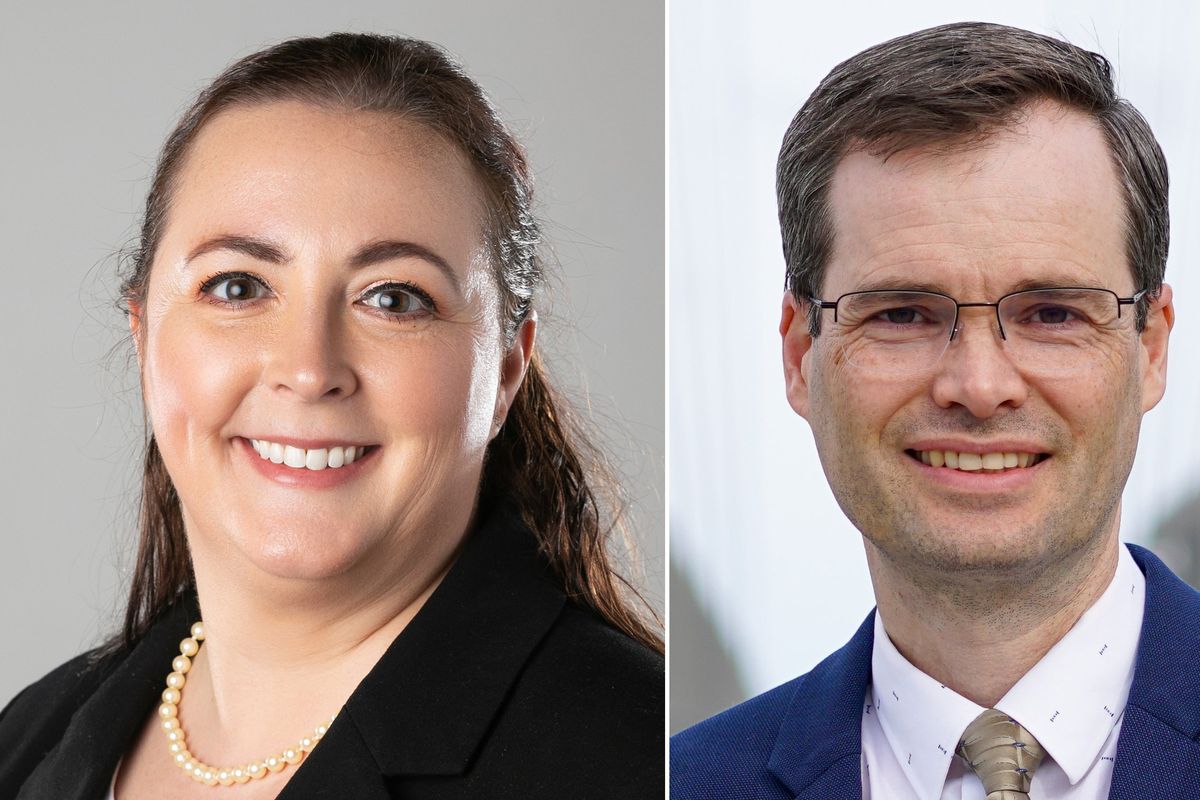Local lawyers Deanna Crull and Andrew Biviano competing for Spokane County district judge position in November election

Two lawyers with extensive local experience who have recently shifted to sitting on the bench are seeking to replace Debra Hayes as one of Spokane County’s eight district court judges.
Deanna Crull, 46, is running against Andrew Biviano, 47, in the nonpartisan election for the seat. District judges serve four-year terms and preside over misdemeanor criminal cases, traffic infractions, small claims issues, protection orders in cases of domestic violence or harassment and therapeutic court proceedings.
Crull and Biviano both cited diverse professional careers, in both prosecution and defense, as a qualification to sit on the bench.
“It’s something that I’ve thought a lot about. I think I’ve positioned myself in a way that makes me the most qualified, given my experience,” said Crull, a 2001 graduate of Gonzaga Law School who currently serves as the prosecutor for the city of Ritzville. She’s also what’s known as a “pro tem,” or substitute, judge for the Kalispel Tribal Court, Spokane County District Court and the city of Airway Heights.
Biviano, also a graduate of Gonzaga’s Law School in 2006, pointed not just to his legal career as a prosecutor with the United States Attorney’s Office in Eastern Washington and as a civil defense attorney in private practice, but as a former case manager in social work at what is now Frontier Behavioral Health, as evidence of the perspective he’d bring to the court.
“I’ve been there, walking alongside the people that are most likely to come to district court, to show them how to get their underlying challenges addressed,” Biviano said.
Biviano has also been serving as a pro tem judge in district court since late last year.
Both candidates said a district court judge has the additional responsibility to help explain the legal system to the members of the public who come before them.
“I think it’s very important to make sure that you’re able to communicate what’s going on, because a lot of people are in there for the first time. They have no idea,” Crull said. She added that’s especially true of a client who may not speak English proficiently and others in need of therapeutic services, but who are unaware such options exist.
Most of the people who argue before district judges are representing themselves, Biviano said. That often puts the onus on the judge to look at the case law and help determine disputes, then explain the result in terms the public can understand.
“It’s challenging, but it’s rewarding in a way that’s hard to explain,” Biviano said.
Though the candidates both acknowledged the need for therapeutic courts for those experiencing mental health or substance issues, as well as military veterans, there are cases where punishment is warranted. Gross misdemeanor charges, which are heard by district judges, carry a potential penalty of up to a year in jail and fines totaling $5,000.
“Let me see if I can understand you, have you feel like you’re being seen and heard and understood, and that there’s a better future in store for you,” Biviano said. “Punishment is involved in that too, hopefully in a way that makes people feel like there’s a better option in the future.”
Crull said many of the questions she’s been asked campaigning for judge have to do with concern about rising crime rates.
“I think, always and foremost, is community safety,” Crull said. “And then, how do we reduce recidivism? How do we keep this from happening again?”
Biviano said the run for district judge is a conscious decision to turn away from partisan politics. He ran as a Democrat for county commissioner in 2016 and chaired the local chapter of the Democrats for about a year, ending in January 2018.
“In my practice, I represent people from all across the political spectrum,” Biviano said. “I will defend you no matter what your free speech happens to be.”
Crull said the district judge position would be the continued culmination of a childhood dream. She studied political science before immediately entering law school, continuing an interest in the law that she said began watching black-and-white reruns of the classic “Perry Mason” television series.
“I love the community. I think there’s a lot of positive things that can be implemented to make it better,” she said. “I’m running because I just want to give back. And it’s the way that I know that I can.”
Biviano said he intended to approach the job the same way he’s approached his professional life: protecting civil rights, protecting public safety and helping people seek rehabilitation, when possible.
“I feel like it’s a really nice combination of my two professional careers, mental health and the law,” he said.
Crull has raised $33,387 in support of her campaign, and an additional $12,000 in loans as of Oct. 5, according to the Washington Public Disclosure Commission. Among the contributors to her campaign are Hayes, as well as District Court judges Patrick Johnson, Donna Wilson and Patti Connolly Walker, and Court Commissioner Eric Dooyema. Among her endorsements are several active and retired Spokane County Superior Court judges.
Biviano has raised $13,838 for his campaign, with another $5,000 in loans as of Oct. 5. Among his contributors are Spokane City Council President Breean Beggs, who worked with Biviano at the firm Paukert & Troppman, as well as state Rep. Marcus Riccelli, state Sen. Andy Billig and Washington Commerce Department Director Lisa Brown. Among his legal endorsements are state Supreme Court Justices Helen Whitener and Debra Stephens.
Pay for district judges is established by a citizens commission formed in compliance with the state’s Constitution. That commission set district court judges’ annual salaries at $193,447 for the year beginning July 1, compensation that is provided exclusively by Spokane County.
Ballots will be mailed for the general election in Spokane County in mid-October. Election Day is Nov. 8.